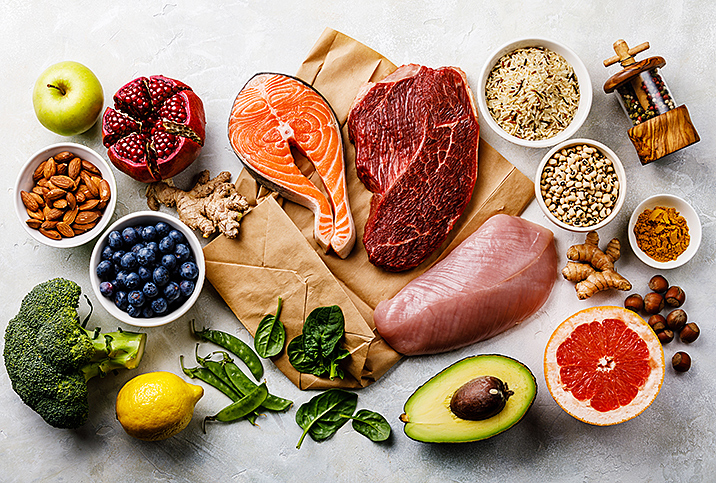How Breast Cancer Patients Can Eat Better

Breast cancer is one of the most pervasive cancers a woman can face: 1 in 8 U.S. women will receive a positive diagnosis in their lifetime.
While diet alone can’t treat breast cancer, food choices may play a significant role in slowing the progression of a tumor and increasing the strength and stamina of your body during the fight against the disease. As well as preventing a recurrence of breast cancer, an appropriate diet can even help obviate it in the first place.
Diet & cancer
The typical Western diet has long been linked to an increased risk of breast cancer. Conversely, other diets—the Mediterranean diet, for example—are associated with a decreased risk.
The relationship between what we eat and diseases is complex. Certain foods, due to their antioxidant, anti-inflammatory and anticancer effects, are extremely beneficial to our health. A plant-based diet promotes healthy body weight and helps prevent obesity and other conditions linked to cancer, including breast cancer.
Fruit & grains
Peaches alone may reduce the risk of estrogen-receptor negative breast cancer by up to 41 percent in postmenopausal women. No small number there. And apples and pears have shown promising protective effects in other studies. Citrus contains folate, vitamin C, carotenoids and flavonoids, all linked to decreasing risk by up to 10 percent. Berries—blueberries, in particular—are also high in antioxidants.
Also, look to cruciferous vegetables like broccoli and cauliflower for protection from cancer, because they are full of anticancer glucosinolate compounds.
Whole grains not only reduce the risk of breast cancer, but, thanks to their high phytochemical content, can also reduce recurrence.
Food choices may play a significant role in slowing the progression of a tumor and increasing the strength and stamina of your body during the fight.
Fatty fish such as salmon and sardines contain high levels of omega-3s, selenium and antioxidants, and those have been shown in research to significantly lower the risk of breast cancer.
Organic foods may reduce the possibility of tumor growth. Organic foods are defined as foods grown in soil that has had no prohibited substances, such as synthetic fertilizers and pesticides, applied for three years prior to harvest. One 2018 study reported organic foods lowered cancer risk by as much as 25 percent.
Supplements & special foods
Low vitamin D levels have been linked to an increased risk of breast cancer. You can elevate your vitamin D level by adding fortified yogurt, orange juice and fish to your diet, but the easiest way is to spend more time outdoors every day. (Remember to wear sunscreen.) Talk to your doctor about taking supplements if you’re concerned you’re not getting enough vitamin D.
Also beneficial are chemicals called flavonoids, specifically flavonols and flavones, which are found in tea, broccoli, onions, parsley and celery. Other phytochemicals called carotenoids can reduce breast cancer risk by 18 to 28 percent. Get carotenoids from carrots, pumpkins, sweet potatoes, squash, dark greens, and other orange, green and yellow fruits and vegetables. Don’t take carotenoids as supplements, though, without your doctor's approval, because they can be dangerous.
Plant phenolics in general—they have been linked to slowed growth of tumors—can be found in a wide variety of foods, including green tea, garlic, soybeans, flaxseed, eggplant, tomato and watermelon.
What to avoid
You should limit sugar consumption because it can lead to obesity and other conditions linked to cancer. Also, minimize saturated and trans fats, common in processed foods and animal products, and opt instead for unsaturated fats.
Swap proteins such as beef, cheese, butter and cream for leaner proteins like fish, chicken or plant-based foods such as tofu, edamame, lentils, quinoa and tempeh.
Discuss your diet, especially any supplements you're planning to take, with your doctor.
Fried and processed food items increase the risk of breast cancer and should be avoided.
Also, stay away from red clover, black cohosh (commonly used as a natural remedy for menopause and other conditions), evening primrose and licorice. In fact, don’t use any supplements or natural remedies that claim to treat or prevent breast cancer. Often, these products contain compounds that breast cancer patients should avoid, and they are rarely tested or approved by the Food and Drug Administration.
Always discuss your diet, especially any supplements you're planning to take, with your doctor to make sure they're a useful part of a prevention or tumor growth reduction program.
Other dietary considerations
Plant-based diets tend to be very high in fiber, and that has been linked to reduced breast cancer risk, particularly of aggressive tumors.
Beans, which are an excellent plant-based source of protein, have long been associated with impressive reductions in breast cancer risk, up to 28 percent. Please note that a high-fiber diet can be hard on your gastrointestinal system if you’re not used to it, so increase your fiber intake slowly.
Although many doctors frown on alcohol consumption, the scientific jury is still out on its effects. Some studies indicate it may increase risk—especially given that alcohol increases blood estrogen levels—but other data suggest small amounts can be beneficial. If you drink, do so in moderation and make sure your doctor knows and approves.
Diet alone may not prevent or treat breast cancer, but it can significantly reduce risk.














